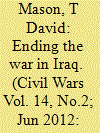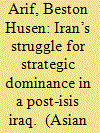| Srl | Item |
| 1 |
ID:
113527


|
|
|
|
|
| Publication |
2012.
|
| Summary/Abstract |
Since the war in Iraq began in 2003, public debate over the war has centered on two options: either increase the number of US troops to defeat the insurgency, or withdraw US forces to reduce US losses. Empirical research on civil war termination suggests that neither of these two options is likely to produce a favorable outcome for the US or the Iraqi government. That same research points to the third option - negotiated settlement - that has been the most frequent manner in which civil wars have terminated in the post-Cold War era. I analyze what existing research on civil war termination suggests about how the civil war in Iraq can be brought to an end. Military victory over the insurgents is unlikely, but withdrawal increases the risk of state failure. A negotiated settlement would require a credible third-party mediator to broker an agreement between the government, Sunni insurgents, and Shiite militias, thereby isolating foreign jihadists to spoiler status. Implementation of the settlement and the durability of the peace would be enhanced by multinational peacekeeping forces.
|
|
|
|
|
|
|
|
|
|
|
|
|
|
|
|
| 2 |
ID:
167683


|
|
|
|
|
| Summary/Abstract |
Iran's influence and presence in Iraq have increased significantly in recent years. The collapse of the Saddam's dictatorship in 2003, after the US invasion, served to inflate Iran's influence in Iraq, particularly in the post-ISIS era. In this connection, Iran has used various means and tools to develop its strategy in Iraq. This article argues that Iran's current strategy in Iraq stems from a Realpolitik agenda rather than an ideological one, concerned more with political, economic, and security interests than pursuing revolutionary objectives per se. To this end, Tehran has largely relied on long-established relationships with several pro-Iranian political parties and militia groups. These relationships are often couched in religious ideological terms as a foundation and justification for its future strategy in post-ISIS Iraq. The questions that this paper will address are the following: what was Iran's role in defeating ISIS in Iraq? How has Tehran benefitted from its long-term relationships with Iraqi political parties and militia groups? What are the Iranian sources of power in Iraq and how do they help Iran gain strategic dominance in Iraq?
|
|
|
|
|
|
|
|
|
|
|
|
|
|
|
|